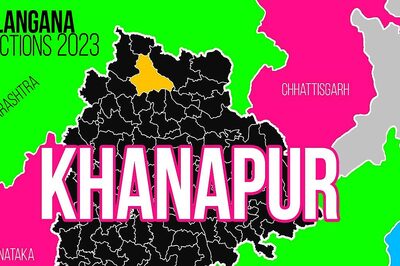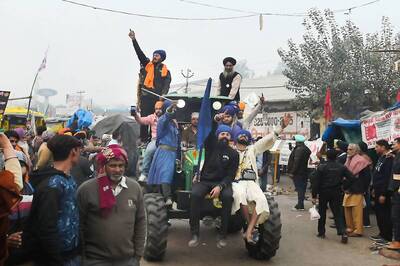
views
MANGALORE: Veterinary doctor Keshav Sullia and his wife do not throw a fit when the labourer does not turn up to milk cows in their farm house tucked deep in the hinterland in Sullia taluk.The couple’s attitude is in stark contrast to that of their peers in urban areas who throw their hands up in despair when the regular maid fails to show up. For those without farm-hands, life-is-as-usual for the growing tribe of horticultural farmers in Dakshina Kannada district who have adapted mechanisation. They use Milk master, an indigenously made machine, to milk eight cows within 30 minutes.Unlike the trend noticed globally, machines here are low cost, user-friendly and indigenously developed innovations redressing specific needs of horticultural farmers in the district. For instance ‘Milk Master’ was indigenously developed when the then existing milking machine was priced not less than Rs 80,000.A decade later, Milk Master and its five variants, developed indigenously by Sullia based teacher-cum-farmer turned inventor P Raghava Gowda, still sell at a base price from Rs 10,605 onwards. This machine, largely instrumental in reviving animal husbandry in hinterland, is now exported to neighbouring countries like Sri Lanka and Bhutan.“Without the modern tools, fields would be fallow for want of labour,” an elderly farmer Gopal Krishna Banari from Puttur reasons. “Mechanisation is inevitable, it is a last bid to remain in farming,” executive editor of Adike Patrike, Shree Padre, the largest selling Kannada monthly agriculture magazine, says.The speed with which mechanisation was embraced surprised even Shree Padre.After the highly successful ‘Yantra Mela’ (2009), organised in Puttur by Adike Patrike’s Farmers First, Campco’s Areca Research and Development Foundation, arecanut peeling machines have become a household appliance.Kedimar Krishna Bhat from Idkidu in Bantwal taluk says the machine, made by two brothers in Sullia, priced from Rs 42,500 onwards is viable for farmers. It does the job of three farm-hands by peeling 40 to 45 kg arecanuts within a hour.“Farmers also have pooled money to buy common machines,” he informs.Mechanical adaptation till the stage of processing has helped farmers like Mahabaleshwar Bhat to engage just one regular farm hand for his sprawling 22-acre plot at Kondapadavu in Bantwal taluk.A science graduate, he was forced to look for alternatives when scarcity of farm-hands hit pepper processing in the year 2000.“Then available high-end models, priced around Rs 75,000, were expensive and did not redress the needs of small farmers like me,” he informs.Just as the mechanical process where labourers crush pepper with their feet, he designed a prototype with rollers to thresh black pepper. ‘Nirguna’, the black pepper peeler powered by 0.5 hp motor threshes 200 to 250 kgs of pepper within an hour. Bhat has sold 600 such peelers, which can also grate coconut, priced less than Rs 10,000.“As I recovered my investment in first year, I have no motive to make a profit,” he says candidly.He followed his success with the peeler, (included in National Innovation Foundation’s national register of grassroots technological innovations) by designing tools like ‘Sac Holder’ (holding sacs), ‘Ball Valve Twister’ (to turn sprinklers on) and a spatula (to separate white meat from outer husk of coconut).During weekends, he is working on pepper harvester and improvising a prototype that can cut open cacao fruit and remove cacao beans. If a labourer takes one hour to remove cacao beans from 10 kg cacao fruits, Bhat’s invention which runs on 0.5 hp motor and six inch pulley removes cacao beans from 40 kg of cacao fruits.Having tuned himself mentally to have minimum farm hands while venturing into agriculture at Banarai in Puttur, Eshwara Prasad P today is at ease single-handedly managing eight acres of arecanut, coconut, plantains and pepper without a regular labourer.As labourers are hard to get, Prasad made inroads in his farm so that the jeep and a trailer could reach any nook and corner of the farm. During the manuring of his farm, he turns the trailer into a temporary plastic tank with a capacity to carry 1,500 lots of slurry.Filtered slurry drained into the mobile tank is used as a manure just as individuals use a hose to water garden plants. A kerosene pump is attached to the hose in order to drain the slurry in quick time. With minimum labour, he has devised tools, to ensure simultaneous spraying of Bordeaux mixture on arecanut inflorescence.Mechanisation of manually done chores like collecting and stocking arecanut in an air-tight chamber with the help of ropeway technology reveals the innovative mind of Prasad.He is now planning to shift the eight inch PVC pipe, which acts as an outlet for arecanut stocked in the chambers, directly onto the waiting trailer.These indigenous innovations are for now a win-win situation for the farmers. “I have not only saved on labour, but also 60 per cent of time,” Prasad reveals.




















Comments
0 comment